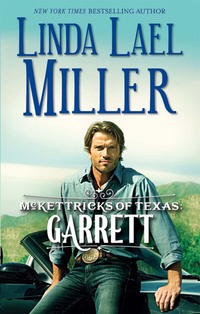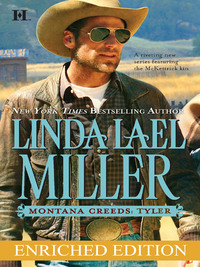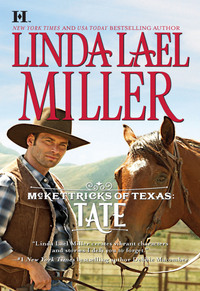
Полная версия
There and Now
By way of an answer, he strode across the room, snatched the pan from the stove and poured the milk into a mug. Then, after setting the kettle in the sink, he grasped Elisabeth’s elbow in one hand and the cup in the other and started toward the stairs, stopping only to blow out the lamp.
The suitcoat, Elisabeth noticed, was left behind, on its peg next to the door.
He hustled Elisabeth through the darkness and up the steep, narrow, enclosed staircase ahead of him. Her knees trembled with a weird sort of excitement as she hustled along. “I’m not crazy, you know,” she insisted, sounding a little breathless.
He opened the door to Trista’s room and carried the milk inside, only to find his daughter sleeping soundly, a big, yellow-haired rag doll clutched in her arms.
A fond smile touched Jonathan Fortner’s sensual mouth, and he bent to kiss the child lightly on the forehead. Then, after setting the unneeded milk on the bedstand, he motioned for Elisabeth to precede him into the hallway.
The fact that she’d originally entered the Twilight Zone from that door was not lost on Elisabeth. She rushed eagerly through it, certain she’d awaken on the other side in her own bed.
Instead, she found herself in a hallway that was familiar and yet startlingly different from the one she knew. There was a painted china lamp burning on a table, and grim photographs stuck out from the walls, their wire hangers visible. The patterned runner on the floor was one Elisabeth had never seen before.
“It must have been the beef casserole,” she said.
Dr. Fortner gave her a look and propelled her down the hall to the room next to the one she was supposed to be sleeping in. “Get some rest, Miss McCartney. And remember—if you get up and start wandering around, I’ll hear you.”
“And do what?” Elisabeth said as she pushed open the door and stepped into a shadowy room. In the real world, it would be the one she and Rue had always shared during their visits.
“And lock you in the pantry for the rest of the night,” he replied flatly.
Even though the room was almost totally dark, Elisabeth knew the doctor wasn’t kidding. He would lock her in the pantry, like a prisoner. But then, all of this was only happening in her imagination anyway.
He pulled back some covers on a bed and guided her into it, and Elisabeth went without a struggle, pursued by odd and erotic thoughts of him joining her. None of this was like her at all; Ian had always complained that she wasn’t passionate enough. She decided to simply close her eyes and put the whole crazy episode out of her mind. In the morning, she would wake up in her own bed.
“Good night,” Dr. Fortner said. The timbre of his voice was rich and deep, and he smelled of rain and horses and pipe tobacco.
Elisabeth felt a deep physical stirring, but she knew nothing was going to come of it because, unfortunately, this wasn’t that kind of dream. “Good night,” she responded in a dutiful tone.
She lay wide awake for a long time, listening. Somewhere in the room, a clock was ticking, and rain pattered against the window. She heard a door open and close, and she imagined Dr. Fortner taking off his clothes. He’d do it methodically, with a certain rough, masculine grace.
Elisabeth closed her eyes firmly, but the intriguing images remained and her body began to throb. “Good grief, woman,” she muttered, “this is a dream. Do you realize what Rue will say when she hears about this—and I know you’ll be fool enough to tell her, too—she’ll say, ‘Get a life Bethie. Better yet, get a shrink.’”
She waited for a long time, then crept out of bed, grimacing as she opened the door. Fortunately, it didn’t squeak on its hinges nor did the floorboards creak. Holding her breath, Elisabeth groped her way down the hall in the direction of the main staircase.
So much for your threats, Dr. Fortner, she thought smugly as she hurried through the large parlor and the dining room.
In the kitchen, she stubbed her toe trying to find the matches on the table and cried out in pain before she could stop herself. The fire was out in the stove and the room was cold.
Elisabeth snatched the coat from the peg and pulled it on, cowering in the shadows by the cabinets as she waited for Jonathan Fortner to storm in and follow up on his threat to lock her in the pantry.
When an estimated ten minutes had ticked past and he still hadn’t shown up, Elisabeth came out of hiding, her fingers curved around the broken necklace in the coat’s pocket. Slowly, carefully, she crept up the smaller of the two stairways and into Trista’s room.
There she stood beside the bed for a moment, seeing quite clearly now that her eyes had adjusted again, looking down at the sleeping child. Trista was beautiful and so very much alive. Tears lined Elisabeth’s lashes as she thought of all this little girl would miss by dying young.
She bent and kissed Trista’s pale forehead, then crossed the room to the other door, the one she’d unwittingly stumbled through hours before. Eyes closed tightly, fingers clutching the necklace, she turned the knob and stepped over the threshold.
For almost a full minute she just stood there in the hallway, trembling, afraid to open her eyes. It was the feel of plush carpeting under her bare feet that finally alerted her to the fact that the dream was over and she was back in the real world.
Elisabeth began to sob softly for joy and relief. And maybe because she missed a man who didn’t exist. When she’d regained some of her composure, she opened the door of her own room, stepped inside and flipped the switch. Light flooded the chamber, revealing the four-poster, the fireplace, the vanity, the Queen Anne chairs.
Suddenly, Elisabeth was desperately tired. She switched off the lights, stumbled to the bed and fell onto it face first.
When she awakened, the room was flooded with sunlight and her nose itched. Elisabeth sat up, pushing back her hair with one hand and trying to focus her eyes.
The storm was over, and she smiled. Maybe she’d take a long walk after breakfast and clear her head. That crazy dream she’d had the night before had left her with a sort of emotional hangover, and she needed fresh air.
She was passing the vanity table on her way to the bathroom when her image in the mirror stopped her where she stood. Shock washed over her as she stared, her eyes enormous, her mouth wide open.
She was wearing a man’s suitcoat.
Her knees began to quiver and for a moment, she thought she’d be sick right where she stood. She collapsed onto the vanity bench and covered her face with both hands, peeking through her fingers at her reflection.
“It wasn’t a dream,” she whispered, hardly able to believe the words. She ran one hand down the rough woolen sleeve of the old-fashioned coat. “I was really there.”
For a moment, the room dipped and swayed, and Elisabeth was sure she was going to faint. She pushed the bench back from the table and bent to put her head between her knees. “Don’t swoon, Beth,” she lectured herself. “There’s a perfectly logical explanation for this. Okay, it beats the hell out of me what it could be, but there is an answer!”
Once she was sure she wasn’t going to pass out, Elisabeth sat up again and drew measured breaths until she had achieved a reasonable sense of calm. She stared at her pale face in the mirror and at her startled blue eyes. But mostly she stared at Dr. Jonathan Fortner’s coat.
She put her hand into the right pocket and found the necklace. Slowly lifting it out, she spread it gently on the vanity table. The necklace was broken near the catch, but the pendant was unharmed.
Elisabeth pulled in a deep breath, let it out slowly. Then, calmly, she stood up, removed Dr. Fortner’s coat and proceeded into the bathroom.
During her shower and shampoo, she almost succeeded in convincing herself that she’d imagined the suitcoat as well as the broken necklace. But when she came out, wrapped in a towel, they were where she’d left them, silent proof that something very strange had happened to her.
With a lift of her chin, Elisabeth dressed in gray corduroy slacks and a raspberry sweater, then carefully blew her hair dry and styled it. She took the necklace with her when she went out of the room, but left the suitcoat behind.
In the hallway, her eyes locked on the door across the hall. She tried the knob, but it was rusted in place, and the plastic seal that surrounded the passage was unbroken.
“Trista?” she whispered.
There was no answer.
Elisabeth went slowly down the back staircase, recalling that there had been two of them in her “dream.” She ate cereal, coffee and fruit while staring at the kitchen table, fetched her purse, got into her car and drove slowly along the puddled driveway toward the main road.
The house still needed cleaning, but Elisabeth’s priorities had been altered slightly. Before she did anything else, she meant to have the necklace repaired.
Chapter Three
“It should be ready by Friday morning,” said the clerk in Pine River’s one and only jewelry store, dropping Aunt Verity’s necklace into a small brown envelope.
Elisabeth felt oddly deflated. She didn’t know what was happening to her, but she suspected that the antique pendant was at the core of things, given Aunt Verity’s stories, and she didn’t want to let it out of her sight. “Thank you,” she said with a sigh, and left the shop.
After doing a little more shopping at the supermarket, she drove staunchly back to the house, changed into old clothes, covered her hair with a bandanna and set to work dusting and sweeping and scrubbing.
She’d finished the large parlor and was starting on the dining room when the doorbell sounded. Elisabeth straightened her bandanna and smoothed her palms down the front of her frayed flannel shirt, then answered the rather peremptory summons.
Ian was standing on the porch, looking dapper in his three-piece business suit. His eyes assessed Elisabeth’s work clothes with a patronizing expression that made her want to slap him.
Ironic as it was, he seemed to have no texture, no reality. It was as though he were the other-worldly being, not Jonathan.
“Hello, Bethie,” he said.
She made no move to invite him in. “What do you want?” she asked bluntly. Her ex-husband was handsome, with his glossy chestnut hair and dark blue eyes, but Elisabeth had no illusions where he was concerned. To think she’d once believed he was an idealist!
He patted the expensive briefcase he carried under one arm. “Papers to sign,” he said with a guileless lift of his eyebrows. “No big deal.”
Reluctantly, Elisabeth stepped back out of the doorway. Since she didn’t feel up to a sparring match with Ian, she didn’t state the obvious: if Ian had left his very profitable seminars and taping sessions to deliver these papers personally, they were, indeed, a “big deal.”
She saw his gaze sweep over the valuable antique furnishings as he stepped into the main parlor. Had his brain been an adding machine, it would have been spitting out paper tape.
“Your father called,” he said, perching in a leather wing chair near the fireplace. “He’s been worried about you.”
Elisabeth kept her distance, standing with her arms folded. “I know. I talked to him.”
Ian sighed and opened the briefcase on his lap, taking out a sheaf of papers. “I’m concerned about your inheritance, Bethie,—”
“I’ll just bet you are,” she interjected, holding her shoulders a little straighter.
He gave her a look of indulgent reprimand. “I have no intention of trying to take anything from you,” he told her, shaking a verbal finger in her face. “It’s just that I have questions about your ability to manage your share of the estate.” He looked around again at the paintings, the substantial furniture and the costly knickknacks. “I don’t think you realize what a bonanza you have here. You could easily be taken in.”
“And your suggestion is…?” Elisabeth prompted dryly.
“That you allow my accountant to run an audit and give you some advice on how to manage—”
“Put the papers back in your briefcase, Ian. Neither Rue nor I want to sell this place or anything that’s in it. Besides that, Rue’s father had everything appraised soon after the will was read.”
Ian’s chiseled face was flushed. Clearly he was annoyed that he’d taken time away from his motivational company to visit his hopelessly old-fashioned ex-wife. “Elisabeth, you can’t be serious about keeping this cavernous, drafty old house. Why, you could live anywhere in the world on your share of the take….”
Elisabeth walked to the front door and opened it, and Ian followed, somewhat unwillingly. Not for one moment did she believe the man had ever had her best interests at heart—he’d been planning to file for changes in the divorce agreement and get a piece of what he called “the take.”
“Goodbye,” she said.
“I’m getting married next Saturday,” he replied, almost smugly, as he swept through the doorway.
“Congratulations,” Elisabeth answered. “You’ll understand if I don’t send a sterling-silver pickle dish?” With that, she shut the door firmly and leaned against it, her arms folded.
Her throat thickened as she remembered her own wedding, right here in this marvelous old house, nearly a decade before. There had been flowers, old-fashioned dresses and organ music. Somehow, she’d missed the glaring fact that Ian didn’t fit into the picture, with his supersophistication and jet-set values.
In retrospect, she saw that Ian had always been emotionally unavailable, just like her father, and she’d seen his cool distance as a challenge, something to surmount with her love.
After a few years, she’d realized her mistake—Ian didn’t want children or a real home the way she did, and he cared far more about money than the ideals he touted in his lectures and books. Furthermore, there would be no breaching the emotional wall he’d built around his soul.
Elisabeth had quietly returned to teaching school, biding her time and saving her money until she’d built up the courage to file for a divorce and move out of Ian’s luxury condo in Seattle.
With a sigh, she thrust herself away from the door and went back to her cleaning. The road to emotional maturity had been a painful, rocky one for her, but she’d learned who she was and what she wanted. To her way of thinking, that put her way out in front of the crowd.
Carefully, she removed Dresden figurines and Haviland plates from the big china closet in the dining room. As she worked, Elisabeth cataloged the qualities she would look for in a second husband. She wanted a gentle man, but he had to be strong, too. Tall, maybe, with dark hair and broad shoulders—
Elisabeth realized she was describing Jonathan Fortner and put down the stack of dessert plates she’d been about to carry to the kitchen for washing. Her hands were trembling.
He’s not real, she reminded herself firmly. But another part of her mind argued that he was. She had his suitcoat to prove it.
Didn’t she?
What with all the things that had been happening to her since her return to Pine River, Elisabeth was beginning to wonder if she really knew what was real and what wasn’t. She hurried up the back stairs and along the hallway to her bedroom, ignoring the sealed doorway in the outside wall, and marched straight to the armoire.
After opening one heavy door, she reached inside and pulled out the coat, pressing it to her face with both hands. It still smelled of Jonathan, and the mingled scents filled Elisabeth with a bittersweet yearning to be near him.
Which was downright silly, she decided, since the man obviously lived in some other time—or some other universe. She would probably never see him again.
Sadly, she put the jacket back on its hanger and returned it to the wardrobe.
By Friday morning, Elisabeth had almost convinced herself that she had dreamed up Dr. Fortner and his daughter. Probably, she reasoned, she’d felt some deep, subconscious sympathy for them, learning that they’d both died right there in Aunt Verity’s house. Her ideal man had no doubt been woven from the dreams, hopes and desperate needs secreted deep inside her, where a man as shallow as Ian could never venture.
As for the suitcoat, well, that had probably belonged to Verity’s long-dead husband. No doubt, she had walked in her sleep that night and found the jacket in one of the trunks in the attic. But if that was true, why was the garment clean and unfrayed? Why didn’t it smell of mothballs or mildew?
Elisabeth shook off the disturbing questions as she parked her car in front of Carlton Jewelry, but another quandary immediately took its place. Why was she almost desperately anxious to have Aunt Verity’s necklace back in her possession again? Granted, it was very old and probably valuable, but she had never been much for bangles and beads, and money hardly mattered to her at all.
She was inordinately relieved when the pendant was poured from its brown envelope into the palm of her hand, fully restored to its former glory. She closed her fingers around it and shut her eyes for a second, and immediately, Jonathan’s face filled her mind.
“Ms. McCartney?” the clerk asked, sounding concerned.
Elisabeth remembered herself, opened her eyes and got out her wallet to pay the bill.
When she arrived home an hour later with the makings for spaghetti, garlic bread and green salad, the moving company was there with her belongings. The two men carried in her books, tape collection, stereo, microwave oven, TV sets and VCR and boxes of seasonal clothes and shoes.
Elisabeth paid the movers extra to connect her VCR and set up the stereo, and made them tuna sandwiches and vegetable soup for lunch. When they were gone, she put on a Mozart tape and let the music swirl around her while she did up the lunch dishes and put away some of her things.
Knowing it would probably take hours or even days to find places for everything, Elisabeth stored her seasonal clothes in the small parlor and set about making her special spaghetti sauce.
Seeing her practical friend Janet again would surely put to rest these crazy fancies she was having, once and for all.
As promised, Janet arrived just when the sauce was ready to be poured over the pasta and served. She had straight reddish-brown hair that just brushed her shoulders and large hazel eyes, and she was dressed in a fashionable gray-and-white, pin-striped suit.
Elisabeth met her friend on the porch with a hug. “It’s so good to see you.”
Janet’s expression was troubled as she studied Elisabeth. “You’re pale, and I swear you’ve lost weight,” she fretted.
Elisabeth grinned. “I’m fine,” she said pointedly, bending to grasp the handle of the small suitcase Janet had set down moments before. “I hope you’re hungry, because the sauce is at its peak.”
After putting Janet’s things in an upstairs bedroom, the two women returned to the kitchen. There they consumed spaghetti and salad at the small table in the breakfast nook, while an April sunset settled over the landscape.
From the first, Elisabeth wanted to confide in her friend, to show her the suitcoat and tell her all about her strange experience a few nights before, but somehow, she couldn’t find the courage. They talked about Janet’s new boyfriend and Rue’s possible whereabouts instead.
After the dishes were done, Janet brought a video tape from her room and popped it into the VCR, while Elisabeth built a fire on the parlor hearth, using seasoned apple wood she’d found in the shed out back. An avid collector of black-and-white classics, Janet didn’t rent movies, she bought them.
“What’s tonight’s feature?” Elisabeth asked, curling up at one end of the settee, while Janet sat opposite her, a bowl of the salty chips they both loved between them.
Janet gave a little shudder and smiled. “The Ghost and Mrs. Muir,” she replied. “Fitting, huh? I mean, since this house is probably haunted.”
Elisabeth practically choked on the chip she’d just swallowed. “Haunted? Janet, that is really silly.” The FBI warning was flickering on the television screen, silently ominous.
Her friend shrugged. “Maybe so, but a funny feeling came over me when I walked in here. It happened before, too, when I came to your wedding.”
“That was a sense of impending doom, not anything supernatural,” Elisabeth said.
Janet laughed. “You’re probably right.”
As they watched the absorbing movie, Elisabeth fiddled with the necklace and wondered if she wouldn’t just turn around one day, like Mrs. Muir with her ghostly captain, and see Jonathan Fortner standing behind her.
The idea gave her a delicious, shivery sensation, totally unrelated to fear.
After the show was over and the chips were gone, Elisabeth and Janet had herbal tea in the kitchen and gossiped. When Elisabeth mentioned Ian’s visit and his plans to remarry, Janet’s happy grin faded.
“The sleaseball. How do you feel about this, Beth? Are you sad?”
Elisabeth reached across the table to touch her friend’s hand. “If I am, it’s only because the marriage I thought I was going to have never materialized. Like so many women, I created a fantasy world out of my own needs and desires, and when it collapsed, I was hurt. But I’m okay now, Janet, and I want you to stop worrying about me.”
Janet looked at Elisabeth for a long moment and then nodded. “All right, I’ll try. But I’d feel better if you’d come back to Seattle.”
Elisabeth pushed back her chair and carried her empty cup and Janet’s to the sink. “I played a part for so many years,” she said with a sigh. “Now I need solitude to sort things out.” She turned to face her friend. “Do you understand?”
“Yes,” Janet answered, albeit reluctantly, getting out of her chair.
Elisabeth turned off the downstairs lights and started up the rear stairway, which was illuminated by the glow of the moon flooding in from a fanlight on the second floor. The urge to tell Janet about Jonathan was nearly overwhelming, but she kept the story to herself. There was no way practical, ducks-in-a-row Janet was going to understand.
Reaching her room, Elisabeth called out a good-night to her friend and closed the door. Everything looked so normal and ordinary and real—the four-poster, the vanity, the Queen Anne chairs, the fireplace.
She went to the armoire, opened it and ferreted out the suitcoat that was at once her comfort and her torment. She held the garment tightly, her face pressed to the fabric. The scent of Jonathan filled her spirit as well as her nostrils.
If she told Janet the incredible story and then showed her the coat—
Elisabeth stopped in midthought and shook her head. Janet would never believe she’d brought the jacket back from another era. Most of the time, Elisabeth didn’t believe that herself. And yet the coat was real and her memories were so vivid, so piquant.
After a long time, Elisabeth put the suitcoat back in its place and exchanged her blouse and black corduroy slacks for another football jersey. Her fingers strayed to the pendant she took off only to shower.
“Jonathan,” she said softly, and just saying his name was a sweet relief, like taking a breath of fresh air after being closed up in a stuffy house.
Elisabeth performed the usual ablutions, then switched off her lamp and crawled into bed. Ever since that morning when she’d recovered the necklace, a current of excitement had coursed just beneath the surface of her thoughts and feelings. She ached for the magic to take her back to that dream place, even though she was afraid to go there.
It didn’t happen.
Elisabeth awakened the next morning to the sound of her clock radio. She put the pendant on the dresser, stripped off her jersey and took a long, hot shower. When she’d dressed in pink slacks and a rose-colored sweater, she hurried downstairs to find Janet in the kitchen, sipping coffee.
Janet was wearing shorts, sneakers and a hooded sweatshirt, and it was clear that she’d already been out for her customary run. She smiled. “Good morning.”









